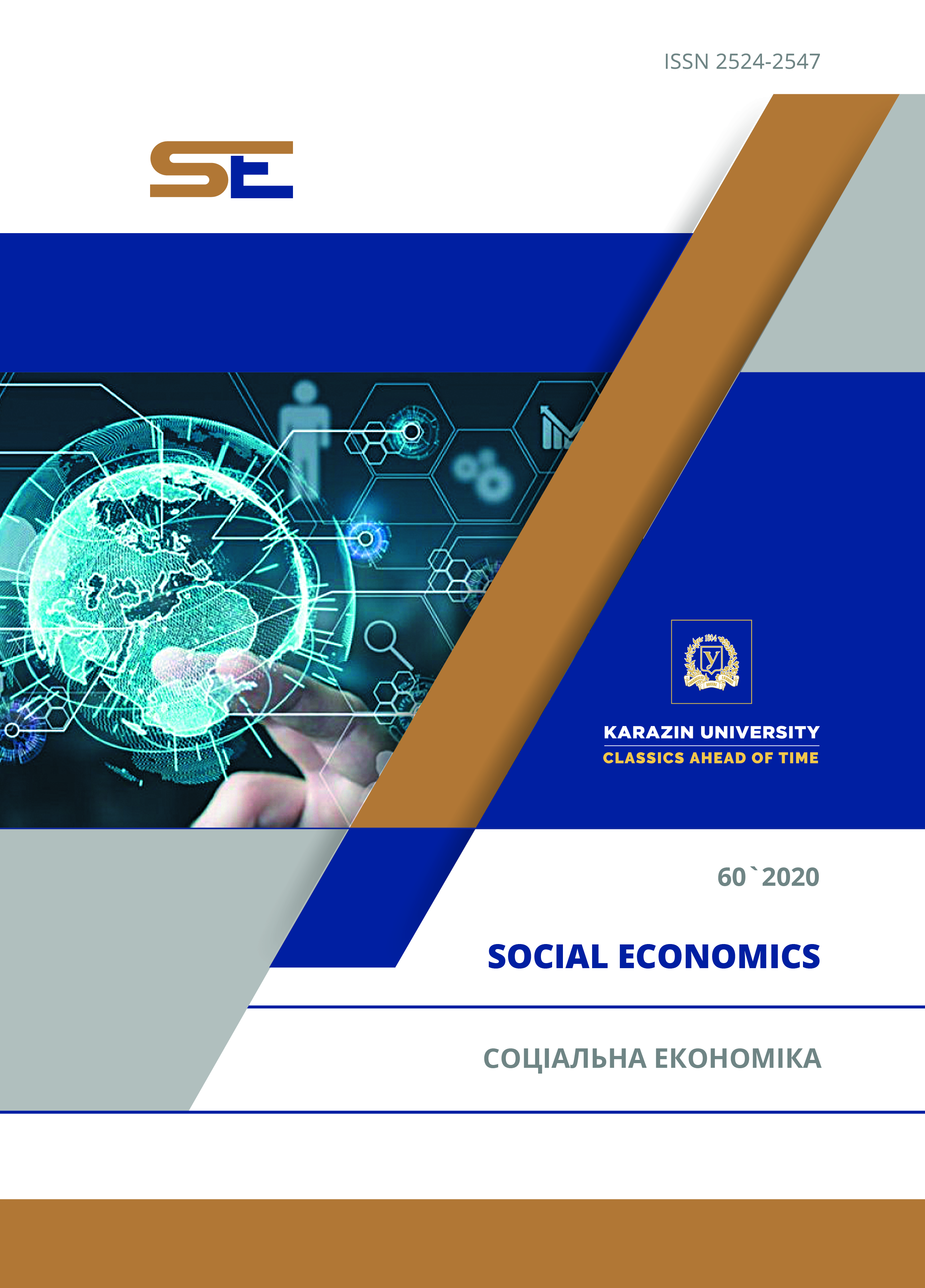ASSESSMENT METHODS OF SMART ECONOMY
Abstract
Smart economics focuses on key areas to achieve its goals. The chain of building relationships is formed within the interaction of various elements of smart economy. In the concept of smart economics, the functioning of the government as the main regulatory element for the formation of this type of economic system within a single economy occupies an important place. In this aspect, the main parameters of the government within the smart economy are transparency, e-government, Open Data. It should be noted that different subjects of smart economics may have different assessment indicators, but they are all within the basic groups of needs and types of economic activity, including: material income; material deprivation; employment opportunities; education and training; functioning of the health care system; dwelling; access to child care; the right to leave; decent social security; safe environment; environmentally friendly environment; non-discrimination; access to justice. For cities, as separate entities of the smart economy, several groups of evaluation indicators are identified, identified in the study of financial centers and global cities. Scientific papers attempt to assess the smart economy by the parameters of the city, including municipal and business services, smart construction, smart education, smart energy and lighting, smart energy metering, smart water supply and recycling, public safety and others. In general, the green economy occupies a very important place in the concept of smart economy, which at the present stage of development acquires new characteristics, including not only environmental projects, but also the parameters of comfortable living and well-being. We can note that the concept of smart economy is quite closely intertwined with the concept of green economy in some indicators, especially with regard to social inclusion and greening. For example, the Green Economy Progress Index identifies gender equality, education, life expectancy, and well-being, which indicates the need to develop a unified approach or index to the assessment of the smart economy.
Downloads
References
GGGI. (2019). Assessment of complementarities between gggi’s green growth index and unep’s green economy progress index. GGGI Technical Report, 10. Retrieved from http://greengrowthindex.gggi.org/wp-content/uploads/2020/04/TR10_Assessment-of-Complementarities_Final.pdf.
Bell, D. (1973). The coming of post-industrial society: A venture of social forecasting. N.Y.: Basic Books.
Global Financial Centres Index 20. Retrieved from http://www.longfinance.net/global-financial-centres-index-20/1037-gfci-20.html.
United Nations. (2017). Green economy progress measurement framework application. United Nations Environment Programme. Retrieved from https://www.un-page.org/files/public/general/green_economy_progress_measurement_framework_application.pdf.
PAGE. (2017). Green economy progress measurement framework. Retrieved from https://www.un-page.org/green-economy-progress-measurement-framework.
Green Growth Index. Retrieved from http://greengrowthindex.gggi.org/#cover.
Held, D., McGrew, A., Goldblatt, D., & Perraton, J. (1999). Global transformations. Oxford. Polity Press.
Heylin, M. (2006). Globalization of science rolls on. Chemical and Engineering News, 84(48), 26-31. doi:10.1021/cen-v084n048.p026.
Kellner, D. (2002). Theorizing globalization. Sociological Theory, 20(3), 285-305. doi:10.1111/0735-2751.00165.
Mazurenko, V. P. (2014). Introduction of network paradigm as mortgages of high competitiveness of country. Actual Problems of International Relations, 119(2), 60-73. doi:10.17721/apmv.2014.119.2. (in Ukrainian)
Nelson, R., & Winter, S. G. (1982). An Evolutionary Theory of Economic Change. Cambridge, Mass.: Harvard University Press.
Novotny, R., Kuchta, R., & Kadlec, J. (2014). Smart City Concept, Applications and Services. Journal of Telecommunications System & Management, 3(2). doi:10.4172/2167-0919.1000117.
Regional indicators of socioeconomic well-being. Retrieved from http://ec.europa.eu/social/BlobServlet?docId=17480&langId=en.
Schumpeter, J. A. (1939). Business Cycles. N.-Y.: McGrow-Hill Book Company. Pp. 5-49.
Smart Economy: Economía Inteligente. Retrieved from https://web.ua.es/en/smart/smart-economy-economia-inteligente.html.
Smart Government. Retrieved from https://web.ua.es/en/smart/smart-government.html.
Taking the Measure of Countries and Well-Being. Retrieved from https://www.usnews.com/news/best-countries/articles/2019-02-15/taking-the-measure-of-countries-and-well-being.
The Competitive Position of London as a Global Financial Centre. Retrieved from http://www.zyen.com/PDF/LCGFC.pdf.
Sassen, S. (2001). The global city: New York, London, Tokyo. Princeton: Princeton University Press.
The Global Financial Centres Index, 28 September 2020. Retrieved from https://www.longfinance.net/media/documents/GFCI_28_Full_Report_2020.09.25_v1.1.pdf.
The Global Financial Centres Index. Retrieved from https://www.longfinance.net/programmes/financial-centre-futures/global-financial-centres-index/.
Inozemtsev, V. L. (1998).Outside the economic society. M.: «Academia»-«Nauka». (in Russian)
Kanigin, Y. (1993). Intelligence of the people. Bulletin of the Academy of Sciences of Ukraine, 7, 37-47. (in Ukrainian)
Lukyanenko, D. G., & Kalchenko, T. (2008). Global governance strategies. International economic policy, 8-9. Retrieved from http://journals.uran.ua/jiep/article/view/27496/24678. (in Ukrainian)
Liakh, V. V., & Udovik, S. L. (2006). Finska model informatsiinoho suspilstva: pryklad dlia nasliduvannia (peredmova) // Kastels M., Khimanen P. Informatsiine suspilstvo ta derzhava dobrobutu. Finska model (pp. 15–22.) / Per. z anhl. K.: Vyd-vo “Vakler”. (in Ukrainian)
Maksimova, V. F. (2011). Smart (intellectual) economy: goals, objectives and prospects. Open education, 3, 63-71. Retrieved from https://cyberleninka.ru/article/n/smart-intellektualnaya-ekonomika-tseli-zadachi-i-perspektivy/viewer. (in Ukrainian)
Machlup, F. (1966). Production and dissemination of knowledge in the United States. Moscow: Progress. (in Russian)
Peters, T. (2010). In search of perfection. Lessons from America's Most Successful Companies. M.: Publishing house Alpina. (in Russian)
Senge, P., Kleyner, A., Roberts, Sh., Ross, R. B., & Smit B. Dzh. (2003). Tanets peremen: novyye problemy samoobuchayushchikhsya organizatsiy. M.: ZAO «Olimp-Biznes». (in Russian)
Chukhno, A. (2005). New economic policy (theoretical and methodological principles). Economy of Ukraine, 7, 15-22. (in Ukrainian)




